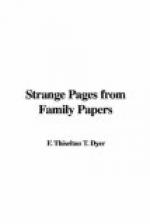Another curse, which may be said to have a historic interest, has been popularly designated the “Midwife’s Curse.” It appears that Colonel Stephen Payne, who took a foremost part in striving to uphold the tottering fortunes of the Stuarts, had wooed and won a fair wife amid the battles of the Rebellion. The Duke of York promised to stand as godfather to the first child if it should prove a boy; but when a daughter was born, the Colonel in his mortification, it is said, “formally devoted, in succession, his hapless wife, his infant daughter, himself and his belongings, to the infernal deities.”
But the story goes that the midwife, Douce Vardon, was commissioned by the shade of Normandy’s first duke to announce to her master that not only would his daughter die in infancy, but that neither he nor anyone descended from him would ever again be blessed with a daughter’s love. Not many days afterwards the child died, “whose involuntary coming had been the cause of the Payne curse.” Time passed on, and that “Heaven is merciful,” writes Sir Bernard Burke,[5] Stephen Payne experienced in his own person, for his wife subsequently presented him with a son, who was sponsored by the Duke of York by proxy. “But six generations of the descendants of Colonel Stephen Payne,” it is added, “have come and gone since the utterance of the midwife’s curse, but they never yet have had a daughter born to them.” Such is the immutability of the decrees of Fate.
FOOTNOTES:
[1] Harland’s “Lancashire Legends” (1882), 4, 5.
[2] See Sir J. Bernard Burke’s “Family Romance,” 1853.
[3] “Popular Rhymes of Scotland” (1870), 217-18.
[4] See “Book of Days,” I., 559.
[5] “The Rise of Great Families,” 191-202.
CHAPTER II.
The screaming skull.
“Look on its broken
arch, its ruined wall,
Its chambers desolate,
its portals foul;
Yes, this was once Ambition’s
airy hall—
The dome of thought,
the palace of the soul.”
Byron.
There are told of certain houses, in different parts of the country, many weird skull stories, the popular idea being that if any profane hand should be bold enough to remove, or in any way tamper with, such gruesome relics of the dead, misfortune will inevitably overtake the family. Hence, for years past, there have been carefully preserved in some of our country homes numerous skulls, all kinds of romantic traditions accounting for their present isolated and unburied condition.
An old farmstead known as Bettiscombe, near Bridport, Dorsetshire, has long been famous for its so-called “screaming skull,” generally supposed to be that of a negro servant who declared before his death that his spirit would not rest until his body was buried in his native land. But, contrary to his dying wish, he was interred in the churchyard of Bettiscombe, and hence the trouble which this skull has ever since occasioned. In the August of 1883, Dr. Richard Garnett, his daughter, and a friend, while staying in the neighbourhood determined to pay this eccentric skull a visit, the result of which is thus amusingly told by Miss Garnett:




